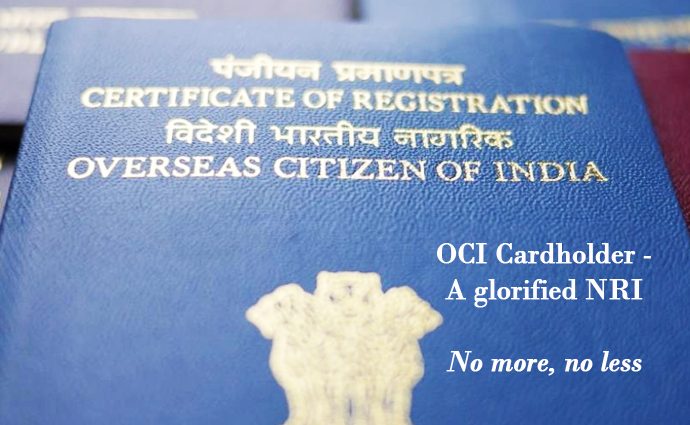The Ministry of Home Affairs has by notification issued on March 4, made changes to some definitions, rules and regulations governing the entitlements given to the Overseas Citizens of India (OCI) card holders. Post March 4 2021, all OCI cardholders will be required to take a special permission from the government of India to be able to involve themselves in certain types of work.
The special authorization/permit required by the OCI cardholder to visit India will for the following purposes:
- to undertake research;
- to undertake any Missionary or Tabligh or Mountaineering or Journalistic activities;
- to undertake an internship in any foreign Diplomatic Missions or foreign Government organizations in India or to take up employment in any foreign Diplomatic Missions in India;
- to visit any place which falls within the Protected or Restricted or prohibited areas as notified by the Central Government or competent authority.
OCI cardholders entering India for any other purposes will not be required to seek that authorization or permit and thus will be exempt from registration with the Foreigners Regional Registration Officer or Foreigners
Registration Officer. However, if there is a change in permanent residential address and in their occupation, they will have to intimate the jurisdictional Foreigners Regional Registration Officer or the Foreigners Registration Officer by email as soon as practically possible.
In March 2020, when the nationwide lockdown was in force following the coronavirus outbreak, 233 foreign Tablighi workers were arrested for violations of visa rules.
The OCI cardholders have also been given a major concession and allowed parity with Indian nationals in the matter of tariffs in air fares in domestic sectors, entry fees for visiting national parks, national monuments and museums in India.
They also retained the entitlement to get multiple entry lifelong visa for visiting India for any purpose.
End of Dual Citizenship idea
An OCI cardholder is a foreign national holding a passport of a foreign country and is not a citizen of India. Clearing any doubts or room for argument, the notification has stipulated this in the Explanation. It says:
Explanation.─ For the purposes of this notification,─
(1) The OCI Cardholder (including a PIO cardholder) is a foreign national holding passport of a foreign country and is not a citizen of India.
Overrules the Karnataka High Court decision of December 2020:
In December 2020, the Karnataka High Court on Tuesday held that Overseas Citizens of India (OCI) cardholders need not seek admission only under the quota meant for Non-Resident Indian (NRI) students in professional educational institutions (medical/dental or engineering colleges), but are eligible for admission under institutional as well as State Government quota seats. But the notification specifically stipulates that not to be the case. It says:
Parity with Non-Resident Indians in the matter of,-
(ii) appearing for the all India entrance tests such as National Eligibility cum Entrance Test, Joint Entrance Examination (Mains), Joint Entrance Examination (Advanced) or such other tests to make them eligible for admission only against any Non-Resident Indian seat or any supernumerary seat:
Provided that the OCI cardholder shall not be eligible for admission against any seat reserved exclusively for Indian citizens;
In that decision, a division bench of Justices B V Nagarathna and N S Sanjay Gowda pronounced the judgement and confirmed an order passed by a single judge directing the State and the Karnataka Examination Authority (KEA) to permit the petitioners to register for CET.
Allowing the petitions filed by Pranav Bajpe and others, who are OCI cardholders, the Bench quashed Section 2(1)(n) of the Karnataka Professional Educational Institutions (Regulation of Admission & Determination of Fee) Act, 2006, as amended in 2017, to include ‘Overseas Citizens of India’ or ‘Overseas Citizens of India Cardholders’ within the definition of ‘Non-Resident Indian’.
“We would like to remind ourselves of the ancient Indian thought, ‘Vasudhaiva Kutumbakam’, which means ‘the world is a family’. The minor children of Indian citizens born overseas must have the same status, rights and duties as Indian citizens, who are minors,” the Bench said.
This notification has nullified that decision and narrowed down the seats meant open for OCI cardholders to apply for.
The OCI card holders also get parity with NRIs in purchase or sale of immovable properties other than agricultural land or farm house or plantation property. They also get pareity with NRIs if they want to pursue, meeting all the legal requirements, the following careers in India, namely:-
(a) doctors, dentists, nurses and pharmacists;
(b) advocates;
(c) architects;
(d) chartered accountants.
In respect of all other economic, financial and educational fields not specified in this notification or the rights and privileges not covered by the notifications made by the Reserve Bank of India under the Foreign Exchange Management Act, 1999 (42 of 1999), the OCI card holder shall have the same rights and privileges as a foreigner.
It is clear from the notification, the default premise of OCI card has shifted from being Indian – foreigner. Such are the compulsions of modern international diplomacy in the new, globalized world.
Similar Posts by The Author:
- Dowry harassment in Australia? Report it in Australia NOT in India says Punjab and Haryana High Court
- International Students: Why Australia doubled Visa application fees
- False promise of marriage: Courts should ensure law is not misused against men
- Hats off to Asaduddin Owaisi, to invoke Palestine in oath-taking
- Arvind Kejriwal release stuns many: ‘Sir Ji’ gets regular bail

